I’ve written several posts about a fairly new phenomenon in the world of writing scams: scammers that falsely use the names of reputable publishing professionals, including literary agents and publishers, to lure writers into paying large amounts of money for worthless, substandard, and/or never-delivered services.
This time, I’m breaking down a very similar scam that, capitalizing on the pandemic-fueled popularity of Netflix and other streaming services (as well as the eternal writerly dream of having one’s book translated into film), is appropriating the name of Clare Richardson, Senior Scout for film and TV at the New York office of Maria B. Campbell Associates, to hoodwink writers in an unusually complicated–and expensive–scheme.
Here’s “Clare’s” initial approach:
Warning signs abound. First, it’s Maria B. Campbell Associates, not Maria Campbell Associates (a small error, but it’s unlikely a real literary scout would get the name of their own agency wrong). Second, the scammer uses a gmail address (mariacampbellassociates@gmail.com), which not only is implausible for an agency with its own web domain, but doesn’t match the email address on the agency website (info@mbcbook.com). Third, not only are such out-of-the-blue approaches rare, a real literary scout won’t offer to act as your social media broker, or to hook you up with book video providers. That’s not what scouts do.
However, an eager writer–especially an inexperienced one, their head spinning with visions of Netflix fame and fortune–could be pardoned for missing these hints of bogosity. The scammer is counting on it.
If the writer responds, they get an immediate followup:
“Clare” is signaling the next step: the pitch for money. And boom! Less than two hours later:
The stench of rat is even more apparent here. Like a reputable literary agent, a reputable literary scout won’t ask for upfront money, or make buying some sort of service a condition of working with them. Also, “Clare’s” description of the representation process is 100% not how it works–a real literary scout sends out writers’ books or manuscripts, not video trailers and screenplays written by random, un-named “professional content writers”. And anytime someone who offers to represent you tells you that you don’t need a contract, run like hell.
Again, though, inexperienced writers may not recognize the warning signs. Plus, in a world where writers and publishing people never stop talking about social media and self-promotion, “Clare’s” recommendations may seem to make sense…especially since “she” appears to be open to the writer buying services from someone else. (It’s a trick many scammers use, knowing very well that few potential victims will know how to “find another company to help you”.)
Given the go-ahead, “Clare” responds with this:
Now, if you looked at the links in the first paragraph of this post, “Mia Roberts” and “Chapters Media” may ring a bell. That’s because this is the same outfit that’s running a similar scam using the name of Jennifer Jackson of the Donald Maass Literary Agency. After all, if your scam plan is to impersonate a literary professional, why stop at just one?
If the writer contacts Mia (which this writer did, the same day), they get a quick response offering social media marketing packages starting at $1,399. The Chapters gang is certainly aware that credit card charges can be successfully disputed by defrauded authors, so they’ve taken steps to make sure that doesn’t happen:
Having wired their money away, the author hears from yet another character.
Later, “Emma” sends the writer a “campaign proposal” consisting of windy (but carefully vague) promises, generic social media “strategies” (Facebook ads, etc.), and a pledge to make regular progress reports. We’ll have those million impressions before you know it! Around the same time, the writer hears from “Clare”:
The purpose here isn’t just to make it look like “Clare” is working for the writer, with fancy-sounding marketing promises that the writer has no way to verify (are ebook displays at book fairs even a thing? Not to mention, again: this is not what a literary scout does). It’s to set the writer up for the next phase of the scam: book orders! From a real bookstore!
This is an email that might make any writer flip out. Seven stores! 500 books! For each store!
Never mind that no independent bookstore chain is going to place such an enormous order for a book by a non-celebrity author (though an inexperienced writer may not realize this). Never mind that, as with “Clare Richardson”, the email address is wrong: another gmail address, josephbethemailconsultant@gmail.com, rather than the email format Joseph-Beth actually uses (unfortunately, not so easy to determine, given that Joseph-Beth doesn’t provide an email address on its website). And never mind that no bookseller would claim that any author–or publisher–had to obtain “Insurance Proofs to cover for possible loss”. Why? Because there’s no such thing.
Something the scammer, again, is betting the writer doesn’t know.
At this point, Mia takes over–by phone this time, since phone calls are a better persuader than emails. No bookseller, she claims, will place an order unless the author has insurance and is “registered” with Ingram. If you want to sell books, you really don’t have a choice. It’ll cost you nearly $6,000, but don’t faint: Tamara’s amazing book order will not only cover the expense, but make sure there’s a profit! (The scammer is hoping the writer isn’t aware of how bookstores actually buy and sell books.) Of course, Mia will handle all the arrangements, so you don’t need to worry about where to send your money. Just wire it to Chapters Media.
To scammers like the Chapters Media mob, writers are frogs to be boiled. Lure them with what seems like an amazing offer (for instance, by what appears to be a reputable literary scout) costing a large, but not necessarily eye-popping, amount of cash. If they hop into the pot (thereby identifying themselves as willing marks), lull them with promises, fake progress reports, and even a bit of flattery while turning up the heat with another offer, for even bigger money. If they still don’t sense they’re being scalded and pay up, do it again. And so on, until the writer realizes they’re on fire or the scammer decides that all the meat is off the bones, at which point the scammer disappears.
That’s what happened to two of the writers who kindly provided me with all this documentation. One, who shelled out only for the social media campaign, was so disgusted by the campaign’s low quality that they started asking questions, at which point Mia and crew ghosted. Later, the writer found my blog.
The other writer bought the book insurance, and quickly received another “order” from another purported bookstore–which, of course, required yet more insurance. After they wired the cash, the booksellers canceled, and Mia and her band of thieves stopped responding to emails and texts. The writer is out more than $13,000.
********
Some basic tips for protecting yourself:
1. Know how things work in the publishing world. Agents and scouts don’t charge upfront fees. They don’t sell marketing services, or refer writers to companies that do, as a condition of representation. And they don’t commonly contact writers out of the blue. The warnings at the Writer Beware website can help you recognize non-standard or predatory practices.
2. Proceed from a point of skepticism. An unsolicited contact from a literary agent or scout isn’t automatically suspect. As commenters have pointed out on a number of my other posts, it does happen. But, as mentioned, it’s not common. Out-of-the-blue contacts are far more likely to be illegitimate than on the level. Caution is always in order.
3. Mistrust–and verify. Google all the individuals and/or companies that are mentioned to see what information you can find…and do it BEFORE you respond. Are there complaints? Have they shown up on this blog? If someone claims to work for an agency, visit the agency’s website to see if that person is mentioned–and be suspicious if they aren’t. If an individual or company claims to have placed books with reputable publishers, or to have sold film or other subsidiary rights, see if you can verify the claim–and if you can’t, or if there are no researchable details attached to the claim (such as names or book titles), be wary. If the name and bio check out, but the approach seems suspicious (if their English is ungrammatical, for instance, which many scam approaches are), don’t be afraid to contact the agency to ask.
4. Use your common sense. Anyone can make an occasional typo, but professionals communicate professionally (no reputable agent would send out language-challenged emails like the ones above). Check the email address and any links–do they match the person or company claiming to be contacting you? If it’s a gmail address from someone purporting to represent an established literary agency, be extremely skeptical; a real agency email address will reflect the agency’s domain. If there’s a demand for money, or if there’s a service for sale, be sure it’s a company that customarily charges such fees or offers such services (reputable agents and scouts generally don’t).
5. Contact Writer Beware. Always a good default. We may have heard something, or received complaints. If we have, we’ll let you know.
Finally, I want to note that, while writers are the scammers’ principal targets, the agents, scouts, and agencies are also victims. Scams like the one described above are a form of identity theft, tying the person’s name and reputation to dishonest and predatory practices that they are then forced to disclaim. Everybody loses–except the scammer, of course.
Hopefully, with increased awareness, we can make it more likely that the scammers will be losers, too.
UPDATE 11/12/20: The Clare Richardson impersonator seems to be aware that writers are getting wise to the scammers’ accents.
UPDATE 4/18/23: The Maria B. Campbell impersonation scam is still active. From a comment on a different blog post, here’s the latest solicitation. Hadley Ramsay really does work at the agency, but note the gmail address and the incorrect agency name in the first line. Additionally, genuine outreach of this type would include the title of the book and would indicate how the scout came across it.
Dear [redacted].
My name is Hadley Ramsay, I am a Senior Scout for Film/TV of Maria Campbell Associates. We are not a Literary Agency and do not represent authors. We do not accept unsolicited materials or phone calls either because we only work with Literary Agents connected to the organization. Maria B. Campbell and her colleagues are identified as Netflix’s sole scouts for new upcoming projects. Also trusted by other Hollywood Producers.
We would like to offer your book a chance to pave the way in the movie industry. If you would like to take this opportunity, kindly provide your Literary Agent’s contact information so we can provide him/her with the complete list of requirements for submissions.
All the best,
Hadley Ramsay
Senior Film ScoutFilm Acquisitions Department | Maria B. Campbell Associates
mariacampbellassociates@gmail.com
381 Park Avenue South Suite 1321 New York, NY 10016



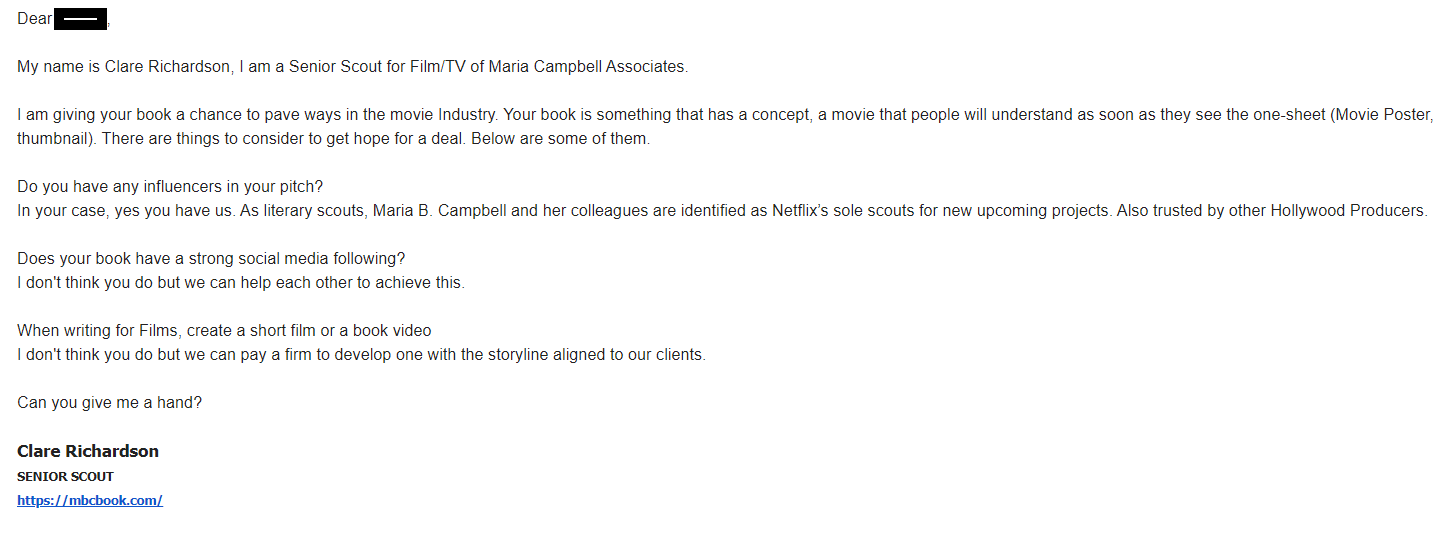
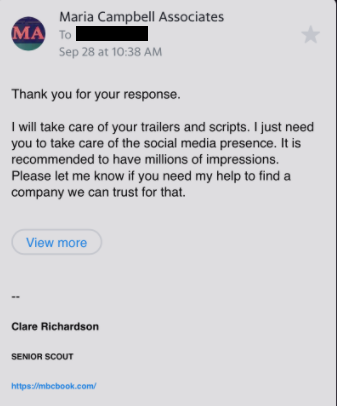
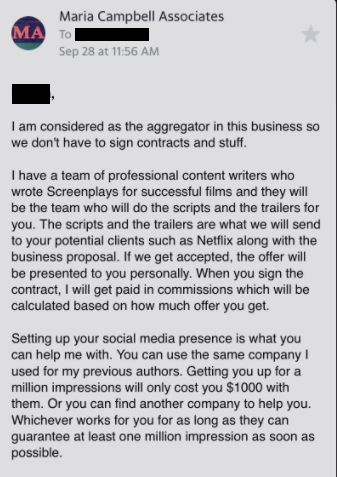

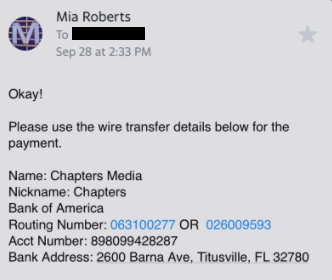
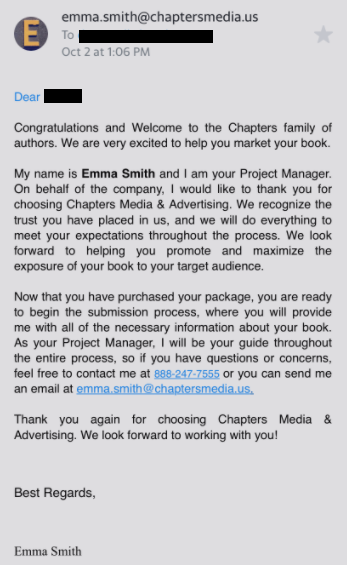

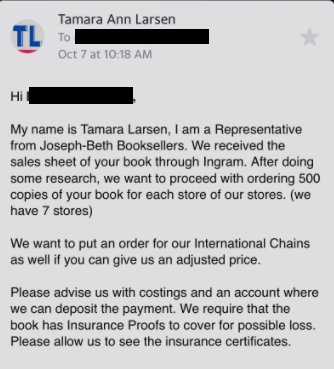

Daily I have dodgy so called book scouts after my book. They even reduce fees pretending they’re so desperate for my book or doing me a favour. The worst one was from this bogus Maria Campbell asking for 1500 dollars from 3k dollars for a trailer to a ‘film’ that’s not even been made and when I put that to them they simply ignore my query 🤷🏾♀️
Unknown,
It's a bit hard to answer without knowing the specific circumstances. Does this agent normally provide reviews for $200? If so, it's at least a potential conflict of interest. Or is this just a come-on from the conference? Regardless, the AAR Canon of Ethics specifically prohibits agents from "charging clients or potential clients for reading and evaluating literary works."
Some established agents do sell paid services as an adjunct to their agency business, but it's not the norm and where it happens, there should be a wall between the agency and the paid services (i.e., clients are never referred to the paid services, and people who use the paid services aren't eligible for representation). There are also writers' conferences that charge an extra fee for agent "speed dating", and may provide some compensation to the agent for participating. The AAR Canon of Ethics does not prohibit this.
I'm curious to know the conference and the name of the agent. Email me if you prefer: beware@sfwa.org
Your blog is fantastic. I can't believe some people fall for these many scams, but if I were more desperate, perhaps I would too. I have a question for you regarding "real agents" that review books at book fairs. A couple of years ago I was at one (none last year due to pandemic) of a writers group I belonged to. You had to win the chance to have the agent review your work and they stated this was normally a $200 service. I automatically assumed this was not a real agent and that the writer's organization should know better. However, is this a legitimate thing? Will agents charge if they have traveled to a writer's convention? So then this would be like winning a $200 service.I don't remember the agent's name. I noticed a similar set up at a Bouchercon convention I went to many years ago, so it must be widespread.
Thank you for your blog! So happy I found your site. We also received a call from Daniel Parker of Rainbow Experts! I am saddened though that people like him give Filipinos a bad rap. My husband was a Peace Corps Volunteer in the Philipines for 5 1/2 years and his self-published book is about that experience.
Here's his spiel.
Total Investment:
$3.00 per book X 500 Book Copies = $1,500 ONLY! Limited Time Offer!!!
Our division was created to give a chance for self-published books as we have seen first-hand how traditional publishers turn down self-published books.
Sincerely yours,
Daniel Parker
Sr. Literary Advisor – Rainbow Experts
822 Guilford Ave #945
Baltimore, MD 21202
E: Daniel.parker14344@gmail.com
W: http://www.rainbowexperts.com
~~~~~~~~~~~~~~
Blogger Maryam said…
I got an email to republish my self-publish book and advertise it for $999. I am including their info below. Please let me know if you have heard of this company.
Daniel Parker
Sr. Literary Advisor – Rainbow Experts
822 Guilford Ave #945
Baltimore, MD 21202
E: Daniel.parker14344@gmail.com
W: http://www.rainbowexperts.com
12/18/2020 7:48 PM
Blogger Victoria Strauss said…
Maryam,
Rainbow Experts is included in my list of Philippines-based publishing and marketing scams (see the sidebar).
12/18/2020 10:16 PM
Blogger Fred Squillante said…
Wow! I just got a call from Daniel Parker of Rainbow Experts and he gave me a big spiel about getting an advance of $25k – 50K. Wow, is that even enough to make it worthwhile? The catch? All I had to do was pay the print fee of $3/book (600 books), $1800, and they would take care of everything. I'm glad I found your site. Thank you.
2/10/2021 3:45 PM
7 Blades of Legend,
Here are a couple of resources that should help.
Writer Beware's Agents page: general info, warnings, and links to resources to help you find agents: https://www.sfwa.org/other-resources/for-authors/writer-beware/agents/
My article about how to look for an agent while excluding the scammers from your query list: http://victoriastrauss.com/advice/safest/
As a general rule of thumb: treat any out of the blue solicitation as a scam until you can determine otherwise.
I've been getting contacted by every scammer under the sun. Is there not a site authors can use for literary agents to look for us?
Wow! I just got a call from Daniel Parker of Rainbow Experts and he gave me a big spiel about getting an advance of $25k – 50K. Wow, is that even enough to make it worthwhile? The catch? All I had to do was pay the print fee of $3/book (600 books), $1800, and they would take care of everything. I'm glad I found your site. Thank you.
Maryam,
Rainbow Experts is included in my list of Philippines-based publishing and marketing scams (see the sidebar).
I got an email to republish my self publish book and advertise it for $999. I am including their info below. PLease let me know if you have heard of this company.
Daniel Parker
Sr. Literary Advisor – Rainbow Experts
822 Guilford Ave #945
Baltimore, MD 21202
E: Daniel.parker14344@gmail.com
W: http://www.rainbowexperts.com
Ugh, this is so infuriating. The very first red flag is the idea that a literary scout would be reaching out directly to a writer——most scouts work on behalf of international publishers or film/TV studios, and we never interact with (let alone represent) authors themselves.
It's a relatively little-known role in the publishing industry and I'm sure the scammers use this to their advantage. But I would caution readers of your blog that ANY email from someone claiming to be a "literary scout" should be viewed with suspicion.
Done V!
P. Youwell,
I haven't received it. Could you re-send? beware@sfwa.org . Thanks!
Hi V!
I emailed you a screenshot of an email from allegedly Stephenson and Queen, an imprint of Thomas Nelson.
P. Youwell
The first thing I noticed with the first "Clare Richardson" email is that English is not "her" first language. Grammar and vocabulary are both forced and immature. True, sometimes scammers do have immaculate English, but I'd add this to the list of red flags: the scammer may have avoided typos, but their style doesn't match the person they claim to be.
Hi Victoria, please check https://stellarliterary.com. They said that HarperCollins contacted them about me and is interested to pick up my book for traditional publication, but before that happens, Stellar Literary Press and Media needs to republish my book first with a fee. It does not make any sense and I have a good feeling that this is another predator.
Thank you for all you do to help us aspiring authors. I know this comes from your heart because you don't have any ads on your blog. It's people like you who restore my faith in humanity.